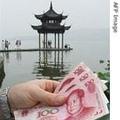China Moves to Internationalize Currency
By Heda Bayron Hong Kong 08 September 2009 China says it will sell $880 million worth of yuan-denominated bonds in Hong Kong, in what analysts say is a first step toward widening the use of the currency outside the country. Starting September 28, investors in Hong Kong will be able to buy bonds issued by the Chinese government. It marks the first time that the Chinese government is borrowing money offshore and paying it back in its own currency.
The Chinese finance ministry says the bond is meant to encourage acceptance of the yuan in international transactions and to encourage Chinese companies to tap the territory's debt market. Kevin Lai, an economist at the Daiwa Institute of Research in Hong Kong, says it is a step toward gradually widening the use of the yuan, or renminbi, outside China. Currently, the currency cannot be traded freely outside the country, and its exchange rate is restricted to a narrow trading band.
"The next step will be to increase renminbi liquidity regionally, and in the end a step toward internationalizing the renminbi…. The renminbi has to be fully convertible at some stage," Lai explained. "Building a bond center, or increase bond issuances for renminbi is just one of those steps." China's step to internationalize the yuan comes after recent comments from Chinese officials calling for a global alternative to the weakened U.S. dollar as a reserve currency. As a way to diversify its debt holdings, Beijing said earlier this month that it will buy $50 billion worth of bonds issued by the International Monetary Fund denominated in special drawing rights - a unit that is based on a basket of currencies.
China is the United States' biggest creditor and holds hundreds of billions of dollars of U.S. bonds.
The dollar's weakness because of the global financial crisis has angered Beijing, because it undermines the value of China's holdings. But the yuan's exchange rate has long been a sore point between Beijing and Washington, as well as China's other trading partners. They accuse China of maintaining an unfair trading advantage by setting its currency's value too low, making Chinese exports artificially cheap. Once pegged to the U.S. dollar, the yuan has been allowed to slightly appreciate since 2005. But the U.S. says the yuan's value should be determined by market forces. Beijing had indicated in the past that Hong Kong will be a center for offshore yuan trading. Five state-owned Chinese banks, including Bank of China and China Construction Bank, have issued yuan bonds in Hong Kong since 2007, when the government began allowing such deals. HSBC, Hong Kong's biggest bank, this year became the first foreign bank to issue yuan-denominated bonds.

